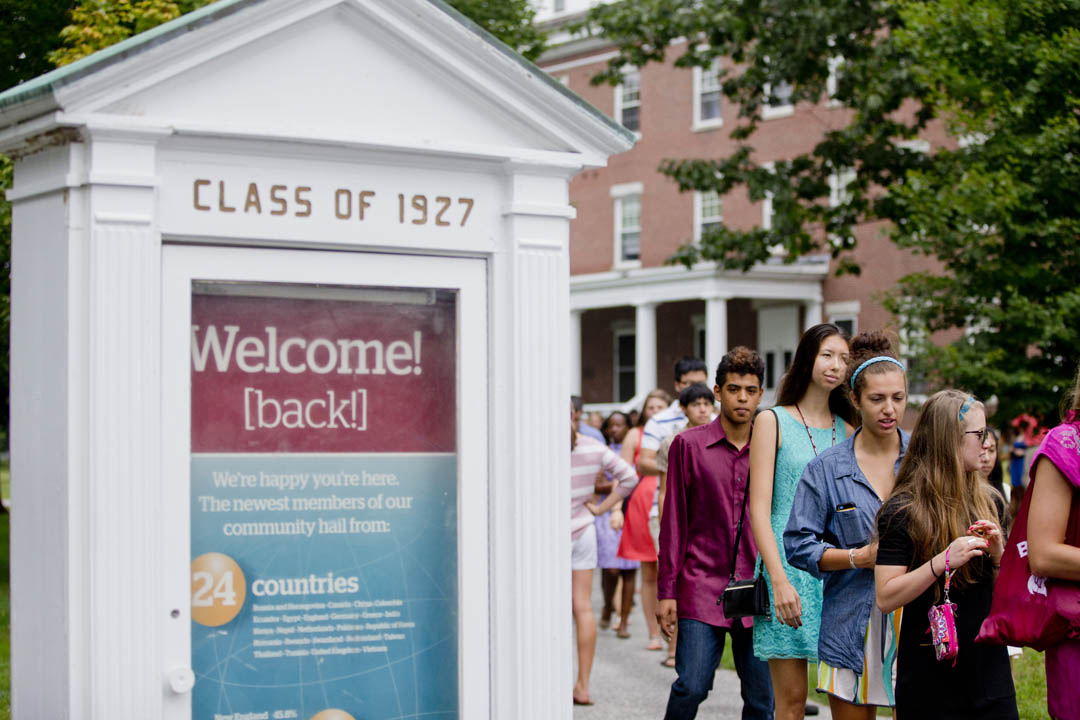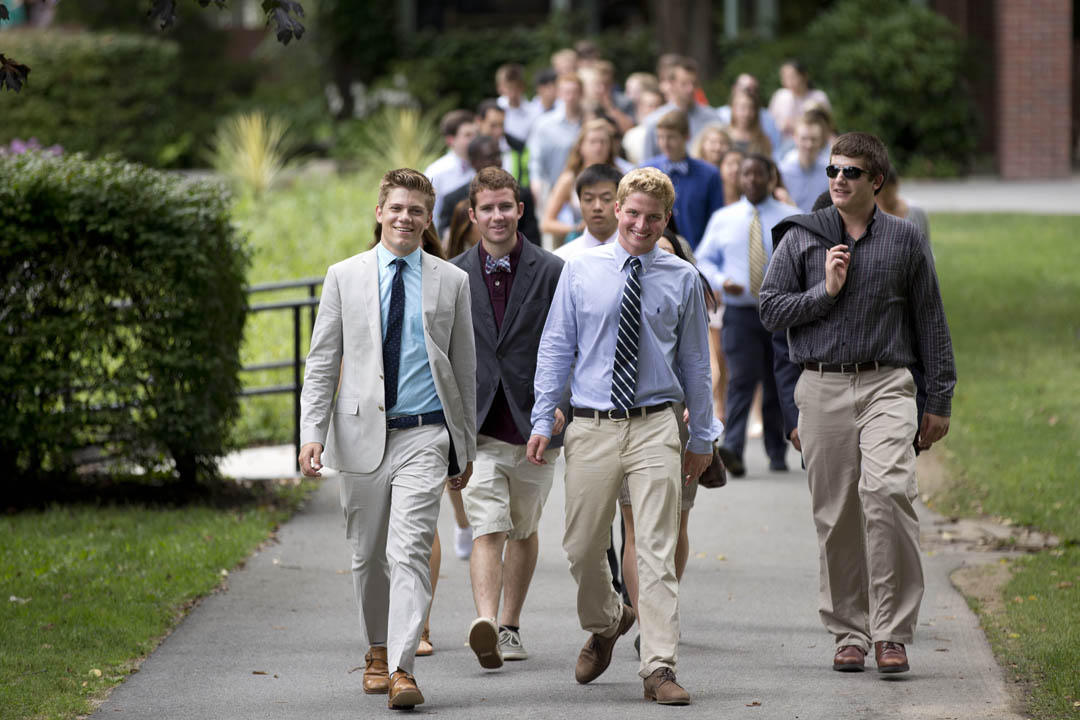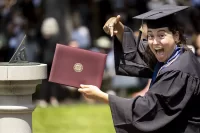
After a summer where endless rounds of pandemic planning and announcements seemed to define the college enterprise, Bates’ Opening Convocation on Sept. 1 offered welcome reminders of what we’re all about.
Presented via livestream, most of the event’s speakers delivered their remarks from otherwise mostly empty Olin Arts Center Concert Hall.
At the lectern, there was President Clayton Spencer, using the moment as a bully pulpit to affirm the power and purpose of the liberal arts in the face of rolling national crises.
Two student leaders, Perla Figuereo ’21 and Lebanos Mengistu ’21, shared the stage, from a safe physical distance, and spoke candidly to their fellow students about how to be their best selves at Bates.
Professor Stephanie Kelley-Romano and Professor Charles Nero, two senior members of the faculty, shared personal stories and hard-earned wisdom in service to the institution and its students.
And, at the end there was a gentle reminder of the daunting shared challenge Bates faces this fall as Multifaith Chaplain Brittany Longsdorf, told the community that “we are called to care for one another and this Bates Community in ways never asked of us before.”
President Spencer
In past years, only rain has driven Opening Convocation indoors. This year, the pandemic drove the event not only inside, to the Concert Hall, but its viewing audience to their laptops, phones, and desktop computers around campus and the world.
Spencer offered greetings to faculty and staff, thanking them for months of “extraordinary work…to adapt literally every aspect of life and work at the college.”
To returning students: “We have missed you terribly.”
And to the Class of 2024, she shared a “fervent hope that when you graduate in May 2024, we will all be gathered in person with your families and loved ones on a glorious sunny morning on the Historic Quad.”
“If we substitute ideology for expertise, we lose our bearings.”
Then it was on to brass tacks: “the liberal arts in the age of COVID” and her thoughts on a summer that confronted us all, “repeatedly and relentlessly, with police killings of Black people and the ongoing devaluation of Black lives.
“These are deeply distressing times for anyone who cares about our country and our fellow human beings. But these are particularly heavy times for the Black, Indigenous, and Brown students, faculty, and staff who are members of our community.”
The stumbling national response to the pandemic, she said, has forced us to learn yet again, “through bitter experience, that if we don’t get the science right, we won’t get the economics right. If we substitute ideology for expertise, we lose our bearings. Without a commitment to facts and evidence, we abandon the fundamentals of discourse, debate, and meaning making.”
“This causes us to get policy wrong and hurt people. It causes us to substitute violence for persuasion. Dealing with the challenges posed by the wicked problems we are up against depends on highly specific expertise, but it requires, in equal measure, the ability to take in information from various domains and form integrated frameworks to guide policy and action.”
Charles Nero and Stephanie Kelley-Romano
Reflecting tradition, the faculty speakers at Opening Convocation are selected by the prior year’s graduating class. It’s a “gift from the Class of 2020 to the Class of 2024,” said Spencer, adding that the 2020 graduates “chose brilliantly.”
Both members of the Department of Rhetoric, Film, and Screen Studies, Nero is the college’s Benjamin E. Mays ’20 Distinguished Professor who studies race and American cinema, queer studies, and African American literature. Kelley-Romano is an associate professor who studies television, conspiracy theories, and presidential campaign rhetoric.
Delivering a recorded Zoom-style talk (Nero from his Pettengill Hall office, Kelley-Romano from home), the pair spoke about the importance of being able to pivot in challenging times, “with adeptness or adroitness” said Kelley-Romano.
Nero described his own pivot as a student. He was drawn to speech communications, specifically rhetoric and public address as he came of age in the American South in the era when the Civil Rights and Black Power movements “transformed the meaning of citizenship for African Americans.”
“White supremacy and anti-blackness metaphorically slapped me in the face every semester.”
Yet, he recalled, he was guided away from elevating Black voices by teachers while he was doing graduate work. A “leading professor of American public address and oratory asked me, ‘Why are you interested in writing about Blacks? Hasn’t everything been written about them?’”
Another professor discouraged Nero from writing about African Americans in 20th century progressive politics because “he was only encouraging his graduate students who were ‘mainstream and central.’”
Seeing how the traditional field of speech communication was aligned with “white supremacy and anti-blackness…metaphorically slapped me in the face every semester.”
Nero pivoted away from traditional speech communication studies, “to African American studies (he is a member of the college’s Africana program) and, especially toward literary and film studies. I embraced Audre Lorde’s famous pronouncement that “the master’s tools will never dismantle the master’s house.”
Though he never left speech communication completely behind — “I still believe that language and its performance are crucial for a democracy” — democracy also requires a commitment to social justice that strives to be inclusive and equitable. “The majors I have been most involved in here at Bates emphasize social justice as crucial components for an undergraduate education.”
Kelley-Romano talked about her experience as a first-generation college student and feelings of shame that initially haunted her during her journey.
“In high school, my guidance counselor told me I was ‘not college material’ primarily, I think now, because my family didn’t have the ‘means’ of many of my classmates. So, my academic journey started in community college.”
“Maya Angelou has a quote: ‘We do the best we can with what we know, and when we know better we do better.’ But at that point, I didn’t know any better.”
Like Nero, Kelley-Romano “did a lot of pivoting”: away from sports, away from one major to another and then another. “I made myself dizzy pivoting between loving lip-gloss and all things pink and simultaneously hating the mass-mediated messages about how I ‘should’ behave and what I ‘should’ want as a woman.”
Her identity, or what she called the performance of her identity, was under scrutiny by multiple audiences “and for the life of me I could not get it right. Maya Angelou has a quote: ‘We do the best we can with what we know, and when we know better we do better.’ But at that point, I didn’t know any better.”
It wasn’t until graduate school that this shifted. Studying rhetoric and the power of language “prompted me to pivot my attention to critique not only the consequences of calling someone a ‘victim’ vs. a ‘survivor’ but the larger systems and their entrenched histories that put the onus on girls to ‘not distract’ boys with tight clothing, to act ‘like a lady,’ and accept that ‘boys will be boys.’”
Looking back, she said, the ability to “pivot between text and context, between exigence and audience, has made me a better scholar, teacher, and citizen.”
Kelley-Romano also spoke as a person in recovery, who has cringed “watching the invariably oversimplified depiction of alcoholism and addiction on television and in film.”
But over the years, she’s seen and continues to track the role of language in reframing addiction, “from a ‘moral weakness’ to ‘chemical dependency’ and now to ‘a person with substance mis-use disorder.’” Each iteration of naming, she said, “redefines the agent and attempts to decrease stigma.”
As they concluded their shared talk, Nero and Kelley-Romano offered a Convocation staple: advice to the first-years. She urged the Class of 2024 to get out of their comfort zones, while Nero told them not to be afraid of getting messy as they venture into the unknown.
“Messiness is the beginning of what the late Congressman John Lewis called ‘good trouble,’” Nero said. “We know you have been taught how to write the best five-paragraph essay ever. We know you can recite facts and follow formulas. But now we want you to follow your heart, informed by your head to create new ways of thinking and being in the world.”
Perla Figuereo ’21 and Lebanos Mengistu ’21
“We want to address how difficult this year has been for many folks,” Mengistu said. “Especially for Black people. We want you all to know that we see you, we hear you, and we stand with you. The injustice that Black folks have faced and continue to face is a challenge on and off campus.”
Student to students, they gave advice.
About academics: “Take a class that interests you, one that you could have never imagined yourself taking,” said Figuereo.
About social life: “Although it can be overwhelming at first, try to connect with your classmates and peers. Try to learn something from everyone you meet. Everyone has a story,” said Mengistu.
And about personal life: “Be comfortable with failure,” said Figuero. “Seek a balance. Be OK with saying no and yes to things when you feel it’s right. Let yourself fall in love with the new things in your life.”
Brittany Longsdorf
Whew. After all that advice and insight, it was time for the benediction and a “collective, centering breath, ” said Multifaith Chaplain Rev. Brittany Longsdorf. “Let us sense the sacred, deep togetherness that only pilgrimaging through unknown territory such as this can bring.”
Her final words: “We are called to care for one another and this Bates Community in ways never asked of us before. May we rise to the occasion with compassion and courage.
“May it be so.”




